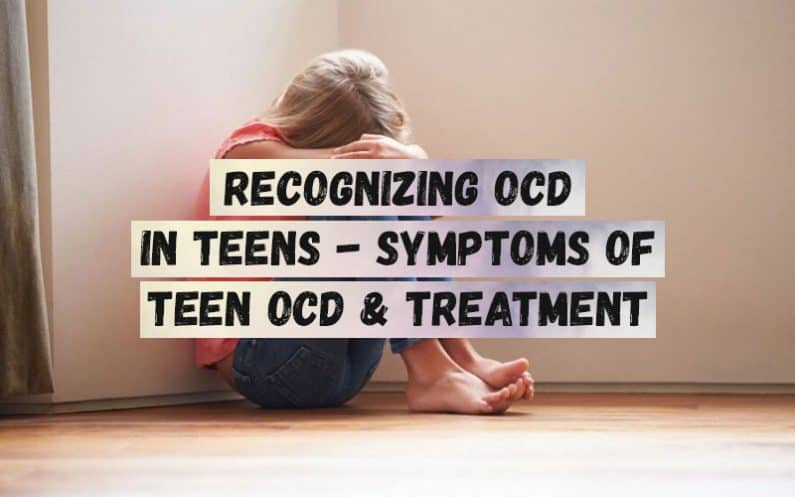This Article seeks to guide on:
- What OCD is
- Common Symptoms associated with teenage OCD
- Types of OCD
- Treatment options available for teen OCD
- Tips for coping with teenage OCD
Many children and teens have lingering thoughts in their minds, and often these thoughts can cause them to perform actions that generally do not make sense. For young children, it can be as simple as not wanting to get out of their favorite bumblebee costume because they feel unsafe or weary outside of it. As parents, we see a child upset, but it might be much deeper than that and the thoughts, coupled with the actions, may be signs of obsessive-compulsive disorder (OCD).
Obsessive-compulsive disorder can be defined as lingering unwanted thoughts and behaviors that occur frequently, take up more than half an hour a day, interfere with one’s daily activities, and cause a feeling of uneasiness or anxiety. The thoughts associated with OCD are known as obsessions, and the actions associated are compulsions. This article will focus on what OCD is, common symptoms of teen OCD, how to recognize teenage OCD, and appropriate treatment of teenage OCD.
Common Teen Symptoms of OCD
If your teenager is often worried about something, and the worry does not go away until they complete a certain action, then a diagnosis of OCD might be appropriate.
To diagnose a teen with OCD, a professional healthcare practitioner considers several characteristics before delivering the diagnosis. The characteristics include the following:
- The thoughts should come from the patient’s mind and not the environment.
- The patient unsuccessfully resists obsession.
- The patient carries out compulsive acts linked to the obsession
- The obsessive thoughts and compulsive actions must be unpleasantly repetitive.
Teenagers with OCD may exhibit the following common obsessions:
- Germophobia (the fear of germs, contamination, and dirt)
- The urge to be orderly
- The need for symmetry
- Religious Obsession
- Worry that they will get sick and die despite their efforts to keep clean
- Fear of touching objects they think are potentially dirty
- Obsession with doing things in a certain order and belief that if not done, a bad outcome will arise
Compulsions often accompany obsessions. Depending on the type of obsession a teenager has, they may develop certain compulsions and repetitive actions to cope with the thought. Common compulsions in teenagers include:
- Excessive hand washing, bathing, and other grooming rituals
- Order rituals that involve arranging objects in a certain order
- Counting rituals
- Excessive cleanliness and other cleaning rituals
- Repeated actions and checking rituals.
OCD can have a profound impact on a teenager’s life. Since OCD takes up a lot of one’s time, it can impact the quality of life of a teenager. It may cause dwindling performance in school and a reduction in quality of life generally. A teen may have compulsions and obsessions that make it difficult to focus on other tasks that improve their quality of life.
Different Types of OCD in Teens
Types of OCD are linked with the compulsions or obsessions that come with them. There are infinite forms of OCD, but four main categories have traditionally been considered the main forms. These categories include:
- Checking
- Contamination
- Intrusive thoughts and ruminations
- Orderliness and symmetry
Checking OCD in Teens
Checking is a time-consuming behavior that involves confirmation of the state of objects. The obsessive thought can be about the fear of causing a fire, leaks, or damage to an appliance or other objects. It often involves confirming whether doors are locked, gas knobs are off, water taps are off, and checking one’s route multiple times while driving. These compulsions can be done multiple times, often lasting up to half an hour and significantly affecting the patient’s quality of life. Checking the route while driving may also cause accidents due to the distraction of checking a screen. Checking may also affect one’s job quality due to significant time being taken to check and recheck things during work hours.
Contamination OCD in Teens
When you think about OCD, you associate it with germophobia and excessive cleaning. This form of OCD involves the fear of contamination or harm through contact with objects perceived as dirty. Its accompanying compulsion is excessive washing of hands and cleaning. Teens suffering from this form of OCD may obsess over the cleanliness of public toilets, door handles and knobs, public restaurants, crowds, money, and clothes. Excessive washing and cleaning may occur multiple times daily, preventing the teen from engaging in day-to-day activities. The obsession with clean air may even prevent one from leaving the house.
Intrusive Thoughts and Rumination in Teens
Intrusive thoughts are obsessive, repetitive, and disturbing thoughts and images. The thoughts may be about causing harm to others, themselves, or animals and are usually not accompanied by compulsions. On the other hand, ruminations are undirected, unproductive thoughts on a particular matter, such as religion, philosophy, and the origin of life. These repetitive thoughts may weigh on the teen, causing them anxiety and distress until they reach a satisfactory conclusion.
Orderliness and Symmetry OCD in Teens
The most common forms of OCD manifest in perfectionism and orderliness. Symmetry involves the desire to have things arranged in symmetrical shapes, such as rectangles and triangles. It may also involve the urge to have things at the center of the table. Orderliness involves wanting things done in a certain order or kept in a certain place.
The Link Between Mental Health and OCD in Teens
Obsessive Compulsive Disorder was previously categorized as an anxiety disorder due to the constant worry and anxiety associated with it. Studies have shown a link between teen anxiety and obsessive-compulsive symptoms (OCS). One study found that the relationship between anxiety and OCD is longitudinal and bidirectional. This means there is a possibility of using aims targeted toward treating anxiety to treat OCD and vice versa. The study also indicated a connection between anxiety and OCS since they mutually influence each other over time.
OCD has also been linked with depression. OCD can lead to teen depression if the obsessive thoughts involve feeling dread and unworthy. This can be observed in intrusive thoughts and rumination, where the thoughts may weigh heavily on the teen’s mind causing them to feel depressed. Compulsions may also cause depression by reducing the teen’s quality of life. This may be due to destroyed relationships and an inability to focus on what may be socially important.
Addressing the Stigma and Misconceptions Surrounding OCD in Teens
Mental illness is not a character defect. OCD, like many other mental illnesses, is caused by biological and environmental factors that are not in the teenager’s control. It can stem from stress, genetic factors, and teen post traumatic stress disorder events.
Despite these facts, society sees people with mental disorders like OCD as outcasts and treats them indifferently. How can we address and stop the stigma to help teenagers and other patients improve their quality of life?
As a parent, you can begin by educating yourself on the disorder. Gather as many facts as you can so that you can have the opportunity to educate others. Knowing the disorder will also help you explain to others how they can change their attitude and behavior on the condition.
Focusing on the positives of OCD and supporting teenagers living with the condition can go a long way toward changing people’s attitudes.
Diagnosis and Treatment of OCD in Teens
A diagnosis of OCD should only be given by a qualified medical practitioner. Once you notice the symptoms of OCD in your teen, consult your primary healthcare provider for a referral to a specialist. You can also complete a 32-item self-report called the Obsessional Compulsive Inventory-Revised-Self Report (ChOCI-R-S). This report has been demonstrated to have acceptable internal consistency in diagnosing OCD.
Despite misconceptions that OCD is untreatable, there are various ways to treat OCD. At Key Healthcare, we specialize in various teen mental illness treatments.
Key Healthcare offers different forms of treatment for OCD, including an intensive outpatient program for teens (IOP), a teen partial hospitalization program (PHP), and a residential treatment center (RTC).
Residential Treatment Center (RTC)
The teen residential treatment program is an intensive 45-60 day program to treat teens with different mental health conditions. It is suitable for OCD treatment as it follows different modalities like teen individual therapy, teen group therapy, and Teen family therapy sessions. Individual and group sessions involve cognitive behavioral therapy (CBT) and Teen dialectical behavioral therapy (DBT). Teen Cognitive behavioral therapy is a tried and tested method of treating OCD. It helps teens manage their thoughts which regulates their obsessions and compulsions. OCD can also be treated through exposure therapy, which involves exposing teenagers to their fears in a controlled setting to manage their thoughts. These evidence-based methods are effective treatments for OCD.
The RTC program takes place in Malibu, Los Angeles, California. It provides 24/7 support to teenagers living with OCD and academic support to prevent your teen from falling behind in school. This form of treatment is reserved for teens experiencing serious mental health conditions.
Intensive Outpatient Program (IOP)
The Key Healthcare teen intensive outpatient program is designed to help teens with mental health challenges. It is a 4-12 week program with treatment administered 9 hours a week. The IOP program involves individual, group, and family therapy to address obsessive thoughts and accompanying compulsions. It provides a supportive environment for teenagers to discuss and work through their struggles. The IOP program is an affordable option compared to inpatient treatment programs.
Coping Strategies for Teens with OCD and Tips for Parents
Dealing with OCD can be difficult. You can use many ways to cope with obsessive thoughts and compulsive behavior. As a teen living with OCD, find an OCD support group. There, you can discuss your struggles with people going through similar experiences. It is also important to have a positive mindset since negativity may be detrimental to your mental health. Do not be afraid to talk to your family and friends about your condition so that they can offer meaningful support. It would be best if you also considered school a priority to create a daily routine.
Parents with teenagers living with OCD can also employ similar methods to help their kids. Talk openly to your teen about their OCD and create a conducive environment for open communication. As a parent, recognize the stigma associated with OCD and help your teen cope with such stigma. You should avoid engaging in repetitive rituals, changes in routine, and prepare to impose consequences.
Teachers can also help manage OCD in school by being understanding. They can offer extra time when taking tests and completing assignments. They can also offer work to be done with peers to build bonds between the students.
Conclusion
In conclusion, OCD involves obsessive thoughts and compulsive behavior. These thoughts and actions can take up much of your teenager’s time and affect their quality of life.
To effectively treat OCD, teenagers need to engage in cognitive behavioral therapy, which helps them manage their thoughts and actions. Talk/Exposure therapy involves exposure to one’s fears and can also help teens manage their thoughts and compulsions.
You can help your teen cope with OCD by understanding its associated stigma and creating an environment where the teen is comfortable expressing their feelings.
Frequently Asked Questions (FAQs)
What are the causes of OCD in teens?
OCD is caused by risk factors such as family history, genetics, stress, trauma, and other environmental factors.
Is OCD common in teens?
OCD is fairly common in teenagers. It is estimated that at least 1 in 200 teens in the United States live with OCD.
Can medication help treat OCD in teens?
Medicine can be important in OCD treatment. Many teenagers living with OCD find that combining cognitive behavioral therapy with medicine treats OCD symptoms.
What happens if OCD is left untreated in teens?
Untreated OCD can lead to the onset/worsening of other mental health conditions, such as depression and anxiety. It may also lead to long-term psychological and social problems.
Can OCD be caused by trauma in teens?
Studies have indicated that trauma may lead to/trigger the onset of OCD. It is not considered a cause but a trigger event. According to the study, trauma in the test subjects was not defined in its strict sense. It involved scenarios ranging from “running a cat over with their car” to “fishing a phone from a toilet bowl.”
How can teens with OCD manage their symptoms in social situations?
Teens can manage their OCD in social situations by controlling their thoughts and compulsions. With cognitive behavioral therapy and exposure therapy, teens can learn to manage their thoughts and control their actions when exposed to triggers.





